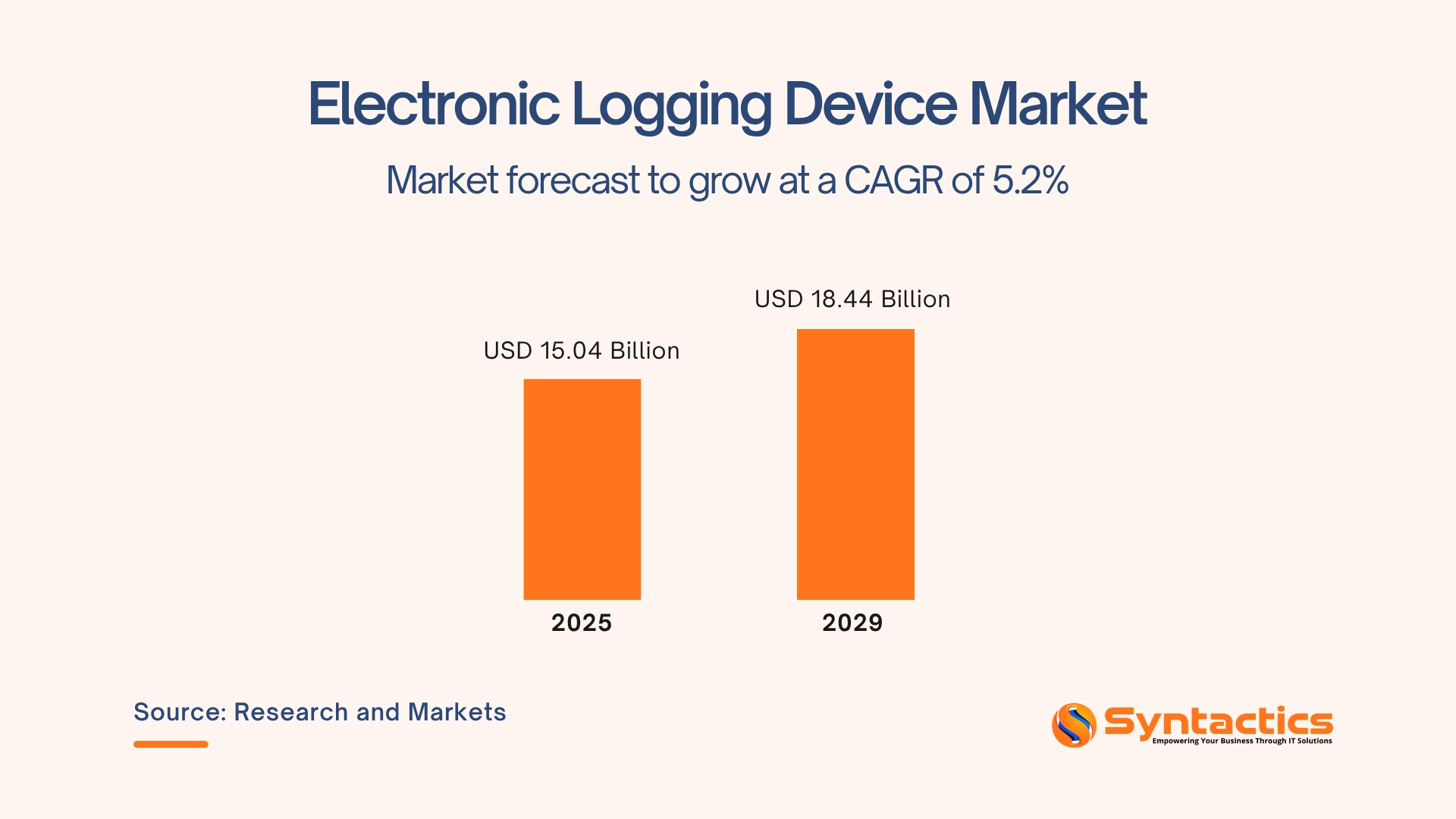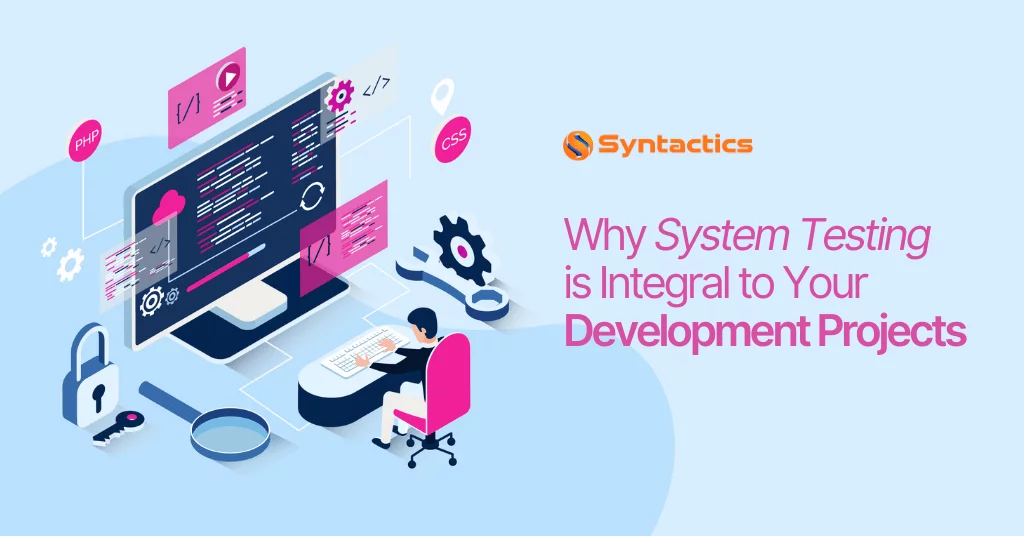
Integrating Electronic Logging Device for Fleet Compliance
CASE STUDY: Learn how our dedicated team built an electronic logging device for our fleet tracking client to ensure compliance and enhance efficiency.
Fleet management is rapidly evolving due to growing operational complexity, regulatory demands, and technological advancements. As businesses strive to keep pace with the tightening of Electronic Logging Device (ELD) compliance mandates, many are turning to advanced fleet tracking and management software to simplify operations.
To support our client in navigating these industry shifts, our dedicated development team built a custom fleet management solution. This approach allowed them to address their specific operational challenges, stay compliant with the ELD regulations, and scale more efficiently.
Source: Research and Markets
Key Takeaways
- Integrating electronic logging devices into modern fleet management software improves compliance and provides real-time driver data.
- Reliable GPS (Global Positioning System) fleet tracking ensures adherence to hours-of-service rules.
- Collaborating with a dedicated team allows for rapid, compliant product delivery without compromising quality or scalability.
About the Client
Our client is a leading provider of commercial vehicle solutions focused on helping businesses optimize fleet operations. Based in California, they offer GPS tracking, driver behavior monitoring, and video telematics to improve driver’s safety and efficiency.
We established our relationship in 2012 and built a platform to support a wide range of industries, including commercial transport, government, and insurance. Both our aim is to reduce risks and cut costs, while staying compliant with the evolving US ELD regulations.
The Opportunity
Before the project began, our client faced significant challenges in fleet operations due to outdated processes and strict regulatory demands enforced across the United States (US) and Canada. Commercial motor vehicles are required to comply with the U.S. Department of Transportation’s (DOT) ELD regulations, which mandate electronic logging of driver hours.
Our client relied on manual systems that were inefficient, error-prone, and non-compliant, leaving them vulnerable to penalties and reputational risks.
These efficiencies had a direct impact on daily operations, increasing administrative burdens, reducing visibility into fleet performance, and exposing the company to compliance violations. Failure to meet DOT standards also threatened customer trust and market position, as their clients increasingly demanded proof of compliance.
That’s why our client sought a robust fleet tracking solution focused on achieving full regulatory compliance and improving driver safety. Their primary goals were to modernize their fleet management system, enhancing operational efficiency via real-time GPS tracking and automated reporting.
This shift aimed to future-proof their services, adhere to FMCSA(1) and CCMTA(2) mandates, strengthening their competitiveness in the regulatory industry.
*1 Federal Motor Carrier Safety Administration
*2 Canadian Council of Motor Transport Administrators
The Solution
Our dedicated development team built a fully ELD-compliant platform designed to support commercial vehicle operations across borders. Our tech stack included ReactJS for web interfaces and native mobile development using Swift and Kotlin, ensuring cross-platform performance and reliability.
To accelerate deployment, we implemented standard-compliant frameworks and provided self-guided training modules. Real-time GPS fleet tracking was embedded into the core system, enabling proactive fleet monitoring and instant compliance reporting.
Our dedicated team ensured high availability and resilience, quickly resolving technical issues during rollout and maintaining uninterrupted service delivery post-launch.
The Result
The new ELD-integrated system delivered immediate business impact:
- Improved Customer Retention: Operators maintained full compliance, strengthening trust and loyalty.
- Competitive Differentiation: Compliance-ready GPS fleet tracking became a key selling advantage.
- Scalable Architecture: System supports ongoing expansion and future DOT regulation updates.
Key Features and Benefits
Besides compliance, our strategic solution delivered substantial operational benefits, such as:
- User-friendly Interface: Enabled smooth adoption of multilingual support across Android and iOS devices.
- Automated Compliance: Simplified Hours of Service (HOS) and Driver Vehicle Inspection Report (DVIR) management with real-time alerts to help minimize penalties and avoid violations.
- Advanced Reporting: Equipped operators with detailed back-office reporting, conflict detection for log inconsistencies, and proactive maintenance alerts.
- Driver Engagement: Integrated a gamified scoring system that promoted safer driving habits and accountability with the fleet.
As a result, operators now benefit from streamlined workflows, reduced violations, and enhanced operational visibility through intuitive fleet management software.
Our Approach: A Structured Workflow for Long-term Success
The process begins with Discovery and Assessment. Our consultants engage directly with our client to fully understand their needs, and come up with a suitable proposal and plan for the project. This is followed by Solution Design, led by our business analyst, who develops a strategic, client-focused plan to address challenges effectively.
During System Setup and Deployment, development sprints are regularly tested in a controlled environment. Our Quality Assurance (QA) specialists thoroughly checked them before being deployed live to ensure stability and performance.
After deployment, Training and Onboarding took place, which included hands-on sessions and comprehensive user manuals to ensure seamless adoption and continuity. We also provided continuous Monitoring and Optimization through built-in system modules and periodic reviews under our maintenance package since the client also availed the maintenance package.
Finally, Ongoing Support and Maintenance ensures the platform remains updated and efficient, with upgrades handled as new projects when needed. This structured yet flexible workflow guarantees reliable, future-ready solutions.
Download our full case study here: Electronic Logging Device Integration for Fleet Compliance.
Final Thoughts
Fast forward to today, we have remained a trusted partner since 2012, with a strong relationship built on electronic logging device fleet tracking solutions. Our continued support has helped the client maintain compliance, improve safety, and streamline operations.
If you’re looking to achieve the same level of success, our skilled and dedicated development team in the Philippines is ready to deliver tailored tech solutions for your business.
FAQs About Electronic Logging Devices
What is an electronic logging device?
An Electronic Logging Device (ELD) is a digital technology that automatically records a driver’s hours of service. It monitors and captures data on a vehicle’s engine, whether the engine is running or moving, miles driven, and engine operation duration. Law enforcers can review a driver’s hours via ELD’s display screen, a printout, or retrieval.
How does GPS fleet tracking improve ELD compliance?
GPS fleet tracking provides real-time visibility into vehicle locations and driver activity, making it easier to monitor and report on ELD data accurately.
Why choose a dedicated team for ELD integration?
Having a dedicated team ensures faster deployment, deeper domain expertise, and tailored solutions that align with complex regulatory and operational needs. Contact us for a discovery call.


















Comment 0